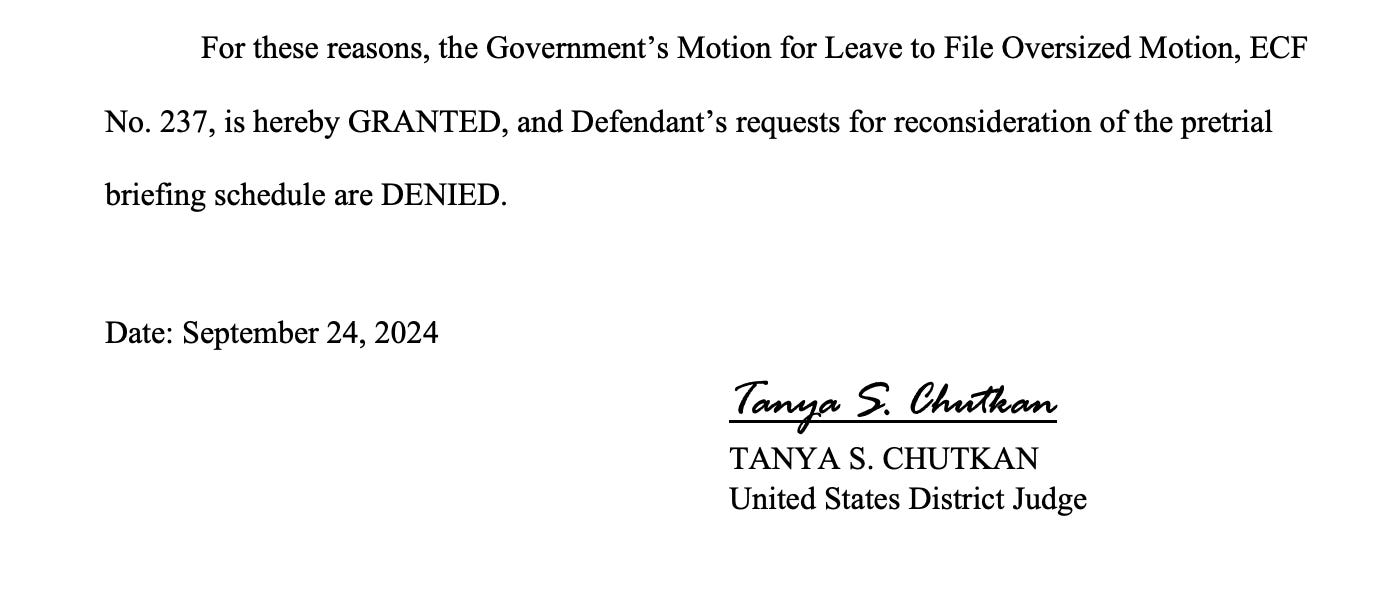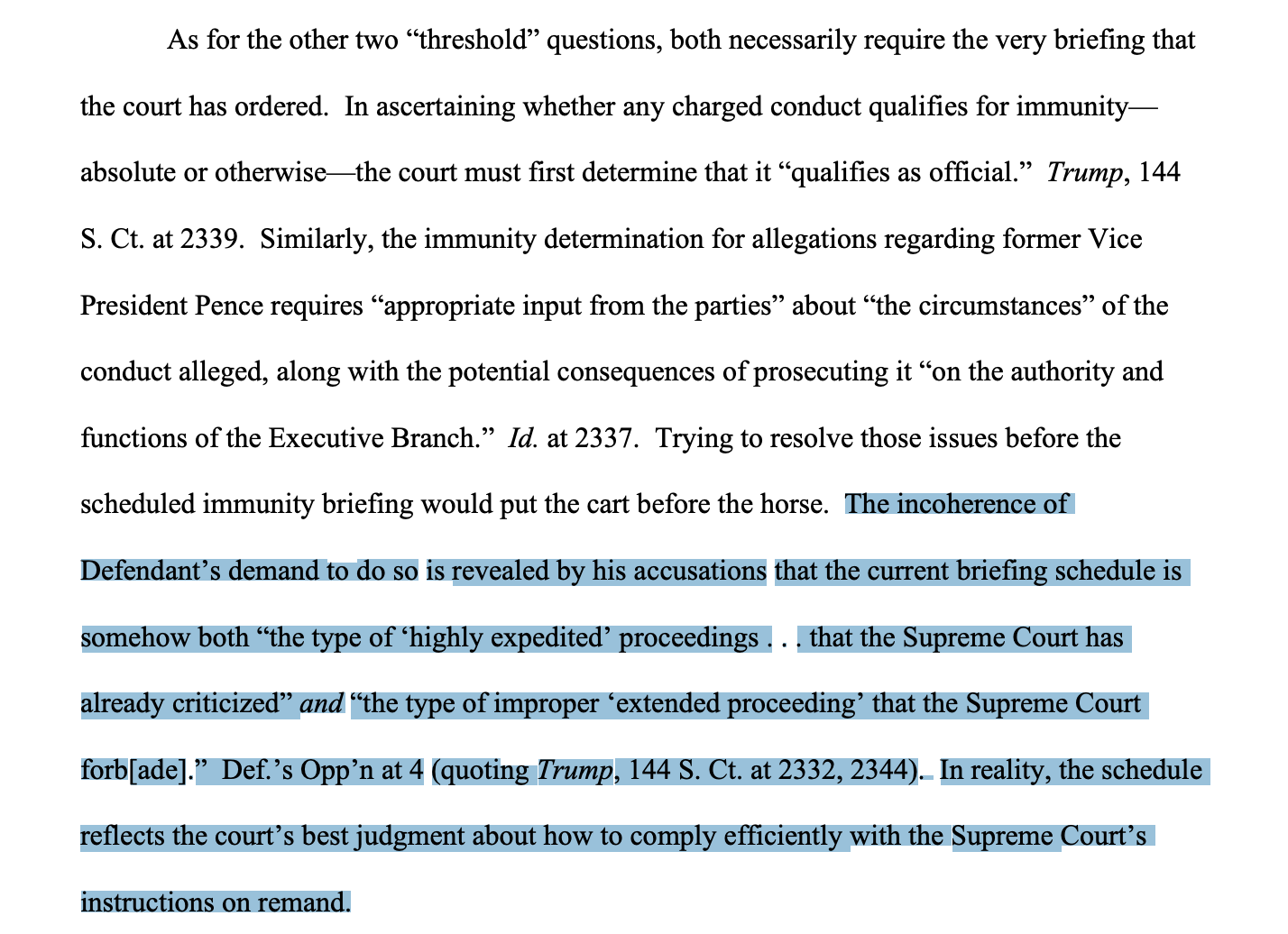Suddenly, there is so much legal news happening that it’s hard to fit it all into the newsletter! We’ll take up the indictment of Ryan Routh, the man who the government alleges attempted to assassinate Donald Trump, this evening. But this morning, I wanted to update you on what happened in the Special Counsel’s case before Judge Chutkan yesterday.
Usually, when a lawyer files a motion “to exceed the page limits,” there’s not much to discuss. Judges grant these motions sparingly and only for good reasons—no judge wants to read unnecessary legal jargon. That’s why most courts have local rules, as the District of Columbia does, that limit lawyers to a set number of pages for certain types of filings, like the 45 pages allotted to Special Counsel Jack Smith for his opening brief on the presidential immunity issue. Forty-five pages is normally a gracious plenty, but occasionally, there is a need for more.
That was always going to be the case here, as Smith’s Washington, D.C., prosecution of Donald Trump geared back up. Yesterday, Judge Tanya Chutkan granted Smith’s request to use around 180 pages to make his case, over Trump’s objections. And those “objections” are worth discussing.
There was good reason for Judge Chutkan to grant Smith’s motion. She noted that, when it decided the immunity appeal, the Supreme Court “directed this court to conduct a ‘close’ and ‘fact specific’ analysis ‘of the indictment’s extensive and interrelated allegations.’ … It anticipated that the analysis would require briefing on how to characterize ‘numerous alleged interactions with a wide variety of state officials and private persons,’ … and supplementing other allegations with ‘content, form, and context’ not contained in the indictment itself.” Given that Smith has a four-count indictment pending against Trump and that his proof involves quite a volume of evidence, it’s more important for him to lay everything out for the court’s consideration and create the record the Supreme Court required, than to abide by page limits that apply to the usual case.
That should have been the end of it, but because it’s Donald Trump, of course, it wasn’t. Trump didn’t just oppose the government’s request. He asked the court to delay the case—without actually asking for delay. He told the court that it should revoke the process it had established for deciding immunity issues, scheduled to start with Smith’s opening brief this Thursday. Instead, Trump argued—although Judge Chutkan previously rejected his position—the court should let Trump file the first brief, and give him several months to do it.
Judge Chutkan didn’t bite. She granted the Special Counsel's request for extra pages and commented on “The incoherence of defendant's demand” to further delay the trial.
Trump’s lawyers may have thought this was a good, sneaky strategy for delaying the process, but Judge Chutkan was unimpressed. In her order, she noted that Trump only devoted a sentence to the subject at hand, page limits. Judge Chutkan wrote, “The rest of the nine-page opposition rehashes Defendant’s position that immunity briefing should not begin until he files a motion to dismiss several months from now. The court has already addressed the scheduling objections Defendant raised when he was given an opportunity to do so.” [emphasis mine]
The point here is that the Supreme Court directed the Judge to develop a detailed factual record to support her rulings on what charges/evidence presidential immunity bars the government from using. That's what she's doing, but Trump jumps at any chance to delay the case. His concern about facing justice, like he did in a Manhattan courtroom, couldn’t be any more palpable. While a routine motion for more pages shouldn’t, and wouldn’t normally, merit our time, here it’s worth reviewing Trump’s arguments because he is going to keep doing this, over and over, to try and prevent the case from going to trial. As the Judge puts it, “For the second time in a week, Defendant urges reconsideration of the current pretrial schedule in a brief intended to respond to a separate issue, and without actually filing a motion to that effect.”
Trump, of course, wants the delay because he doesn’t want the public to see the evidence against him during the election. He claimed, in his page limits response, that it was unfair to let Smith detail the evidence against him in the public record “at this very sensitive time in our nation’s history.” Chutkan responded. Smith’s motion will contain the most exhaustive version of the evidence against Trump to date. But that doesn’t mean it will all become public immediately. Smith has already committed that, pursuant to the existing protective order in the case, he will ask the court to withhold sensitive material from public view. Trump doesn’t have much of an argument here. It’s just about delay, like it always is.
Donald Trump continues to be afraid of the truth.
You can find Judge Chutkan’s full order here. She devotes the remainder of it to considering and easily rejecting five arguments Trump makes for why he, not the Special Counsel, should get to file the first brief on immunity.
First, Trump complains that the Special Counsel “aims to proffer their untested and biased views to the Court and the public as if they are conclusive.” But this, as the Judge points out, is how litigation works. Both sides offer their assessment of a case to the decision maker, “here, whether Defendant’s charged conduct involved official acts and receives immunity.”
Second, Trump wants the Judge to decide legal issues about immunity without considering facts. He says she needs to resolve “the absolute nature of immunity, the immunity attaching to the Office’s allegations relating to Vice President Pence.” The Judge points out she can’t resolve those issues until she knows what the facts are. Trump raises a third point, the one about the lawfulness of the Special Counsel Office’s structure, which led Judge Aileen Cannon to dismiss the classified documents case in Florida. Judge Chutkan points out that isn’t in play here, because of binding case law in the Circuit that supports the Special Counsel’s position.
Third, Defendant argues that immunity briefing “is particularly improper” before the resolution of pending discovery disputes. Judge Chutkan responds that Trump is correct and that she is prepared to rule “expeditiously” on pending issues, so, no problem.
Fourth, Trump argues against permitting Smith to file his brief, saying it would be unfair to him because of the partial gag order in the case, the prohibits Trump from making comments that could endanger witnesses or taint the jury pool. Judge Chutkan responds that he “mischaracterizes the court’s order, and even so identifies potential political consequences rather than legal prejudice.” The court’s order doesn’t limit Trump’s ability to engage in political speech. If he wants to discuss the evidence against him and draw attention to it by responding, he is free to do so.
Fifth, Trump claims Smith’s brief violates internal DOJ policies and “would be tantamount to a premature and improper Special Counsel report.” The policy he is referring to is the often cited rule that directs prosecutors to avoid taking action in an investigation that could impact the outcome of an election. So, prosecutors don’t execute search warrants on a senator’s home the week before an election, or indict a Congressman a few weeks before a primary. Instead, they try to create 30 or 60 days of space between any overt steps they take in an investigation from an election. But DOJ is clear that its internal policies come with exceptions and don’t create any rights a defendant can try to enforce, which is what Trump is doing here. In any event, that policy doesn’t apply in this situation, where a case is already indicted, the public is aware of it, and Justice Department lawyers are complying with a court order to file a brief. Judge Chutkan’s response: “The court need not address the substance of those claims. Defendant does not explain how those putative violations cause him legal prejudice in this case, nor how this court is bound by or has jurisdiction to enforce Department of Justice policy.”
Going through Trump’s arguments point by point takes time, but reveals there is no substantive to anything he argues. It’s unlikely that will stop Trump from claiming that the Judge is biased against him and has treated him unfairly. But now, you know the facts.
We’re in this together,
Joyce





I read it last night and quite laughed.
Those awful Justices and their immunity for "official acts." I dearly hope President Harris's first OFFICIAL ACT is to kick at least 5 of those jokers off SCOTUS, nay 6, as Barrett sentenced a man to death last night against even the prosecutors' wishes.
trump is against anything that does not make him look good, or rather, perfect. It makes perfect sense to me that Judge Chutkan is allowing the extra pages for Jack Smith's brief - he is doing a lot of the detail work for her. What's not to like about that? And trump and his lawyers just don't get that the spaghetti they throw at the judge has nothing to do with real legal issues, and that Judge Chutkan isn't going to eat that spaghetti. I am so glad she is sane! We need to see her type of sanity in all of trump's legal cases.